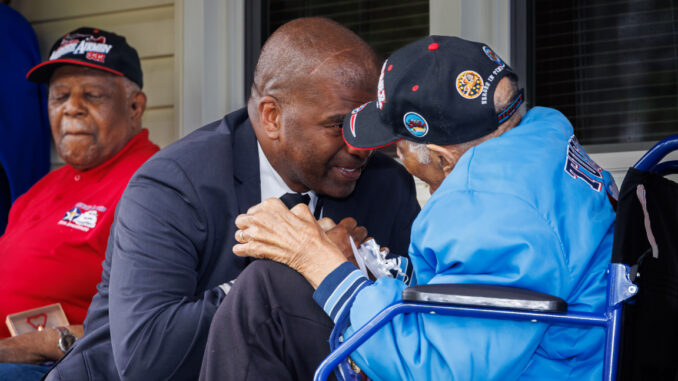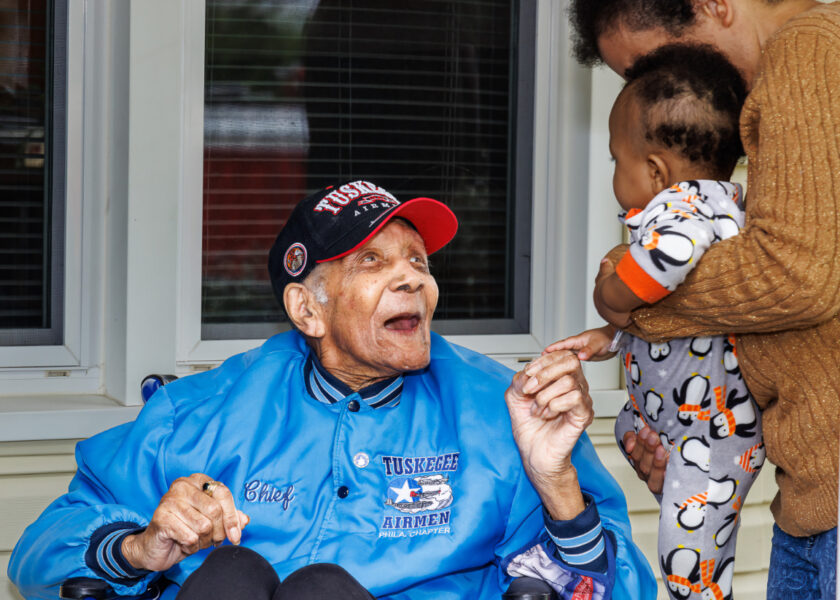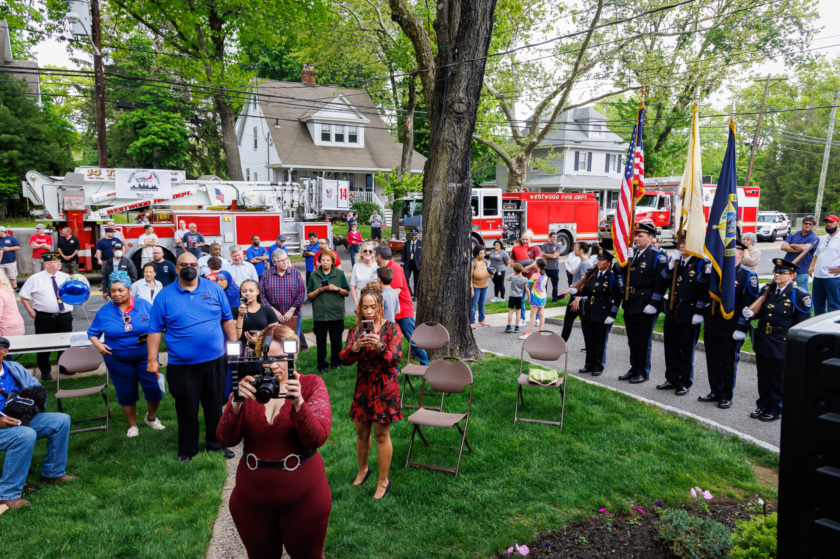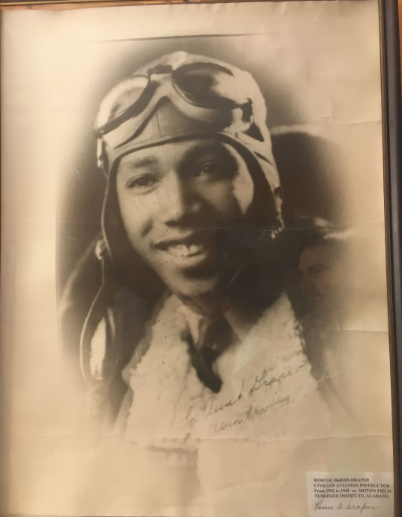
WESTWOOD—Fellow aviators, fellow Westwoodians, and so many more whose lives were touched and are guided by the historic wartime and peacetime service of Pvt. Roscoe Draper were honored to salute him on his 103rd on May 14 in a drive-by birthday procession.
Paying grateful and cheerful respects along Kinderkamack Road, stopping at the home Draper shares with his daughter, were the Bergen County Sheriff’s Honor Guard; Westwood’s police department and volunteer fire and ambulance corps; the New Jersey wing of the Civil Air Patrol; the Federal Aviation Administration; the Tuskegee Airmen Philadelphia Chapter; the Roscoe Draper Chapter (Philadelphia) of the Black Pilots of America; the VFW and American Legion; students from the Westwood Regional School District; Mayor Ray Arroyo; the Borough Council, led by its president, Beth Dell; veterans; family; and many friends.
Derek Grier, president of the Roscoe Draper Chapter of the nonprofit Black Pilots of America, on May 17 lauded the borough for all it had done to celebrate Draper.
“The mayor was fantastic,” he said. “It was a really good event. The town went all out, and it was very moving.”
In its proclamation affirming its gratitude to Draper for his faithful service to this nation, the borough’s governing body noted the details that long have been celebrated in circles that well understand their lift and thrust:
“Whereas it is often the commonplace things that are most telling about the way an uncommon man has lived his life; and whereas Roscoe Draper’s teaching style earned him the affectionate title of ‘Coach’ while he instructed the legendary Tuskegee Airmen from 1942 to 1945 — which implies he not only mastered the effective relaying of technical principles and fundamentals but also established a warm, mentoring relationship with his students — and whereas to still be known as coach 77 years later confirms that Roscoe Draper continues to this day to guide, mold, encourage and lift up those in his orbit, which speaks volumes about the heart and soul of this humble hero and national treasure,” the proclamation reads in part.
It adds, “Whereas upon hearing that a resident has reached the extraordinary age of 103, we should pause to reflect on the influence that one life can have on those around him over the course of a century.”
And it says, “Whereas when a resident is also an historic figure whose life and actions not only positively influenced those around him but affected the entire world during a time of war — and who did so with grace and a warmhearted regard for his fellow human beings — we must pause to marvel at the remarkable inspiration that one man can be, not only in his own lifetime but for generations to follow.”
The proclamation notes the governing body is “proud to represent all of Westwood’s residents, from the ordinary to the famous; having such an inspiring living legend as Roscoe Draper residing in the borough is truly an honor.”

Draper, a native of Haverford Township in Pennsylvania, is a former civilian Tuskegee Airman, part of the U.S. Army Air Corps “Tuskegee Experience” in Alabama that trained Black pilots who served in World War II. The students flew and maintained combat aircraft at a time when the military was highly segregated.
Despite attempts to cancel the program, the Tuskegee Airmen — they were called Red Tails and Red-Tail Angels, with the motto “Spit fire” — went on to serve with some of the most highly respected fighter groups of World War II.
They escorted American bombers in raids over Europe and North Africa. Their distinguished service led to President Harry S. Truman desegregating the military.
President George W. Bush presented the Congressional Gold Medal, the highest civilian award given by Congress, to the Tuskegee Airmen as a group in 2007. Individual members are entitled to receive bronze replicas. The original, by law, is on display at the Smithsonian Institution.
Draper was one of the team’s first 10 flight instructors. He was given the same nickname as Arthur Anderson, Tuskegee Airmen’s chief flying instructor and the man regarded as the father of Black aviation.
In 2019, when we met him three years ago, on the occasion of Rep. Josh Gottheimer (D-5) — on bended knee — presenting him with his brass pressing of the Congressional medal, and a U.S. flag that had flown at the U.S. Capitol, Draper expressed warm gratitude.
“He’s very happy to be 100 years old. He loves people. He’s very happy with his life. We enjoy his presence and he has a lot to teach us,” Norma Crocker, Draper’s daughter, told us then.
Draper had gauged the heft of the medal, which features three Tuskegee Airmen in profile: an officer, a mechanic, and a pilot. The reverse design features the three types of planes the Tuskegee Airmen flew in World War II: the P-40, the P-51, and the B-25.

It is inscribed 2006, Act of Congress, Outstanding Combat Record, Inspired Revolutionary Reform in the Armed Forces.
“I think it’s great. I’m honored and very grateful,” he said.
Gottheimer said in part, “Pvt. Draper has lived a remarkable life and his service to our country is an example to us all. He embodies much that is great about our country. Despite facing intense discrimination, Pvt. Draper stepped up and served our country during World II, protected our democracy and freedom, and we are so much better for it.”
Throughout, Draper showed off a model Stearman Boeing PT-17 “Kaydet” biplane, which served as a military trainer in the 1930s and 1940s, and with which he is intimately familiar.
He said such a trainer is on static display at the Smithsonian’s National Museum of African American History and Culture in Washington, D.C.
“It’s quite possible I flew that very airplane,” Draper said.
When Gottheimer noted that Draper added tenures in the U.S. Postal Service and Federal Aviation Administration to his résumé after the war, he said, “You have a lifetime of service and I’m expecting you to keep serving now, sir.”
Draper agreed, saying, “No big deal.”
Making history

According to historian Theopolis W. Johnson, anyone—man or woman, military or civilian, Black or white—who served at Tuskegee Army Air Field or in any of the programs stemming from the Tuskegee Experience from 1941 to 1949 is a documented original Tuskegee Airman.
Johnson says 2,483 persons were pilot trainees at Moton Field and Tuskegee Army Air Field (AAF) in Tuskegee, Alabama from July 19, 1941 until June 28, 1946.
Draper, one of the first 10 to go to Tuskegee for advanced flight training, enlisted in the Air Corps reserves as a civilian instructor in October 1942.
He earned the moniker “Coach” for his teaching style. He was honorably discharged in November 1945.
“I was not interested in active service,” he told Pascack Press in 2019. He explained that he’d earlier applied for active service but was denied. When African Americans finally were allowed on active duty in 1942 he declined.
“I said, ‘You wouldn’t let me in when I wanted to get in so now that you want me to get in I don’t care to be in.’ That was the way I felt about having been denied. They didn’t want me in then, so I didn’t want to be in now.”
He said he stands by his decision. He’d do it all again the same way.
“Oh yes, oh yes,” he said.
